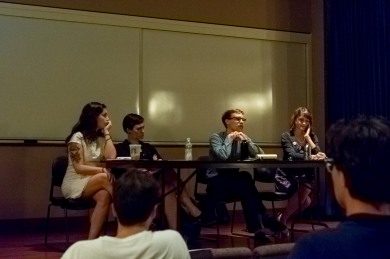By Andrea Garcia

After a Supreme Court decision allowed graduate students to unionize, students from Fordham’s graduate schools held a town hall session to discuss the possibility of unionization. (Andrea Garcia/The Fordham Ram)
As a recent National Labor Relations Board (NLRB) decision in favor of graduate student workers continues to echo amongst private universities, the Fordham graduate student workers have begun their drive to unionize with a town hall this past Friday, Sept. 23. Present at the meeting were undergraduate and graduate students from various academic departments.
Boyda Johnstone, a graduate student and current postdoctoral teaching fellow defined a union. Prior to the NLRB’s decision in August, graduate students were legally considered apprentices rather than employees. Therefore, they could not unionize. Now that graduate students in private universities are considered both students and workers, Fordham graduate students have the opportunity to voice their opinions on working conditions without the threat of losing their jobs. “The work we do here is legitimate and important on its own terms. We are research assistants, writing center tutors and teachers,” Johnstone said.
Because the apprenticeship model is outdated, many Fordham graduate students spend their time putting in not only manual, but also emotional labor in their dealings with undergraduates and faculty members.
“While everything we do in the university could be considered a labor of love, it is still labor,” said Johnstone.
The graduate student community found out at the State of the Graduate School of Social Sciences meeting that health care subsidies will be removed in the upcoming year. Many students in the program do not receive family leave and depend on their partners for a sustainable income.
Johnson hoped the unionization can foster better relationships and solidarity in releasing future grievances.
“There is also a Jesuitical basis for unionization. If workers can join together for the common good, they can fight for a broader social justice, which is within the Jesuit principles on which our university rests,” said Johnson.
To give an insight on the unionization process, Ella Wind, a second year graduate student in sociology at New York University (NYU) devoted her time to the town hall. Serving as NYU’s bargaining chair and unit co-chair in the first year of contract, she advised the union needs to be “organized, persistent and strategic” to make future plans successful.
In NYU’s case, there was a previous union contract at NYU that only protected specific graduate students. Among those excluded were a group of international engineering students who lacked proper visas could only work for the university. They were paid $10 per hour by the university for completing the contracted work of private companies. This led to a union contract. Wind accounts how the student’s salary increased to $15 in the first year of contract, and effectively doubled in the second year.
There are more battles to be won after a union contract falls in place. At NYU, students had to pay out of pocket for a one credit doctoral advising free to stay enrolled in the university’s graduate program. This “ghost course,” as Wind calls it, resulted in an official grievance presented to the administration. Within this past month, the graduate students won their case, and there are no more advising fees at NYU.
The growing trend of union density in metropolitan areas shows that Fordham graduate students are not alone in their initiative. “And that’s why I’m really excited to be speaking here at Fordham,” said Wind. “It would be really exciting to see NYC as a totally unionized area. It becomes more than the sum of its parts.”
Philosophy P.h.D Student Nicholas Berry continued the discussion to elaborate on what the specific details of the contract would be. He pointed out nine individual clauses to define contract coverage, financial details, health and personal benefits, and a procedure to file potential grievances. These specific terms will evolve as the union drive progresses.
The Fordham Student Workers Organization put forward the statement in regards to future action: “We look forward to this conversation growing and deepening in sophistication and effectiveness as we move forward with the support of all of Fordham’s students, adjuncts and full-time faculty. Our progress depends on intercampus and interdepartmental solidarity, as well as future organizing efforts.”
Following this town hall discussion, the organization will be hosting biweekly meetings to revisit the current state of its progress.
